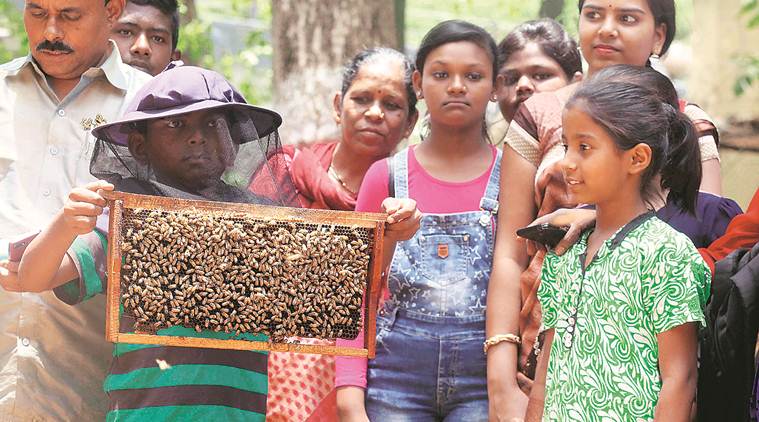 At Central Bee Research and Training Institute. (File photo)
At Central Bee Research and Training Institute. (File photo)
To provide an additional source of income to farmers and promote beekeeping across the country, the Ministry of Micro, Small and Medium Enterprise (MSME) is planning to set up clusters in every locality found to have a potential for setting up apiaries.
A proposal in the matter has been finalised under the Centre’s ambitious National Beekeeping Honey Mission (NBHM) during Union Minister for MSME Nitin Gadkari’s recent visit to Pune-based Central Bee Research and Training Institute (CBRTI). The Ministry has set a target of establishing 100 clusters in the country by March 2021 and plans to add another 100 thereafter.
More than 1.10 lakh bee boxes have been distributed across the country since the launch of the mission in April 2018 — the mission was announced in August 2017.
Currently, either individuals or NGOs are involved in beekeeping, but the costs incurred in retrieving, processing, branding and selling honey are often too high for them to bear. “Besides, the losses incurred due to bad weather and other factors pose a challenge for beekeepers. Under the proposed programme, individuals will work in groups and will be supported through common facilities and infrastructure requirements for beekeeping,” said Lakshmi Rao, assistant director, CBRTI.
The ministry has also approved a three-year programme and chalked out budget allocations in the matter. Accordingly, a cluster of around 500 people will be constituted with each cluster getting a support of Rs 5 crore annually.
“Every cluster will be headed by a group leader from the locality. Depending on the crops and cultivation (in the area), the bee boxes will be placed in the farms or fields. Along with bee boxes, special training will also be imparted to individuals,” Rao said.
In the first year of the three-year programme, clusters will be identified, constituted and groups given basic training in beekeeping. In the second year, advanced training on honey-extraction methods will be imparted, and in the final year, training on bottling processes, use of freezers for storage, collection of pollens, branding and marketing techniques will be provided.
According to CBRTI authorities, another advantage of group beekeeping was the ease in carrying out inter-seasonal migration of boxes, mass procurement of honey and promoting good quality honey for export.
While the CBRTI has been training individuals from all educational, professional and financial backgrounds since its inception, it is for the first time that the ministry has directed the institute to focus on people aged between 18-56 years for this three-year project.
“While we need to promote beekeeping, it must be done in a manner so that the unemployed youth are trained with a professional skill that brings decent earnings. This time, there is a special focus on farmers and unemployed youth,” said Rao.